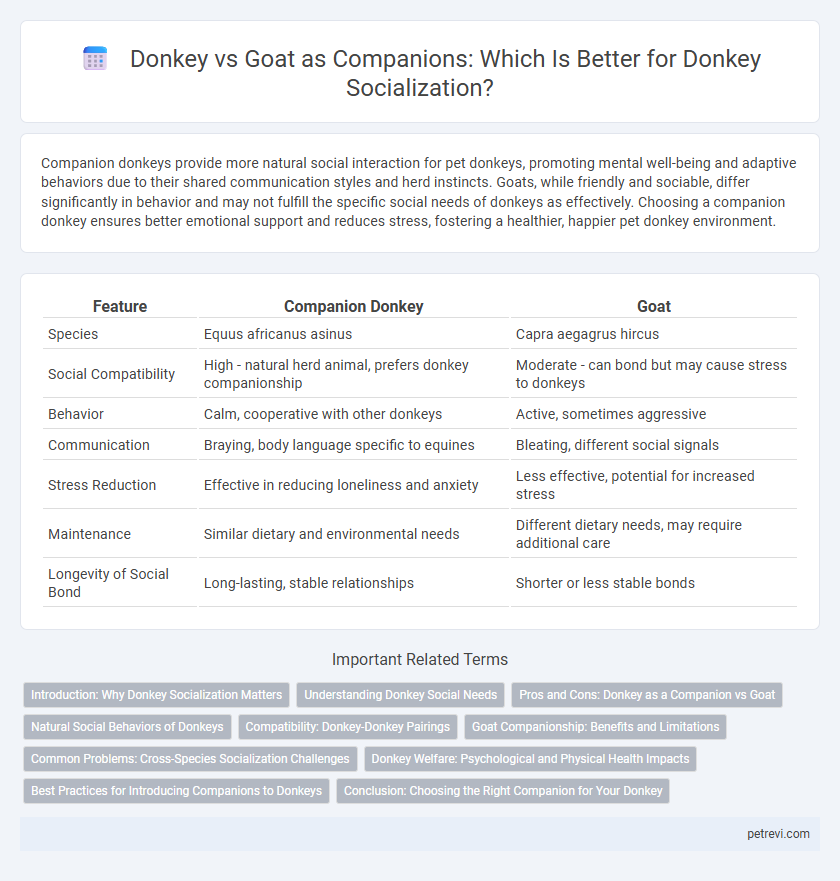Companion donkeys provide more natural social interaction for pet donkeys, promoting mental well-being and adaptive behaviors due to their shared communication styles and herd instincts. Goats, while friendly and sociable, differ significantly in behavior and may not fulfill the specific social needs of donkeys as effectively. Choosing a companion donkey ensures better emotional support and reduces stress, fostering a healthier, happier pet donkey environment.
Table of Comparison
| Feature | Companion Donkey | Goat |
|---|---|---|
| Species | Equus africanus asinus | Capra aegagrus hircus |
| Social Compatibility | High - natural herd animal, prefers donkey companionship | Moderate - can bond but may cause stress to donkeys |
| Behavior | Calm, cooperative with other donkeys | Active, sometimes aggressive |
| Communication | Braying, body language specific to equines | Bleating, different social signals |
| Stress Reduction | Effective in reducing loneliness and anxiety | Less effective, potential for increased stress |
| Maintenance | Similar dietary and environmental needs | Different dietary needs, may require additional care |
| Longevity of Social Bond | Long-lasting, stable relationships | Shorter or less stable bonds |
Introduction: Why Donkey Socialization Matters
Donkey socialization is crucial for the animal's mental and emotional well-being, reducing stress and preventing behavioral issues commonly linked to isolation. Companion donkeys provide natural social structures, mimicking herd dynamics that are essential for their psychological stability. Goats, while compatible in some environments, do not offer the same level of social interaction or herd bonding necessary for optimal donkey health.
Understanding Donkey Social Needs
Donkeys require consistent social interaction to maintain mental and emotional health, making a compatible companion essential for their well-being. Companion donkeys provide more natural social behaviors, such as mutual grooming and vocal communication, which goats may not fully replicate due to species differences. Understanding these social needs emphasizes choosing a fellow donkey to promote optimal socialization and reduce stress-related behaviors.
Pros and Cons: Donkey as a Companion vs Goat
Donkeys benefit from social companions to reduce stress and improve well-being, with fellow donkeys being ideal due to their similar herd instincts and communication methods, promoting natural social behavior. Goats can offer companionship but may introduce risks such as bullying or incompatible social cues, as donkeys and goats have different interaction patterns and dietary needs. Choosing a companion donkey ensures better emotional support and reduces the likelihood of behavioral issues compared to keeping a goat as a social partner.
Natural Social Behaviors of Donkeys
Donkeys exhibit strong natural social behaviors, forming deep bonds and relying on companionship to reduce stress and promote well-being. Companion donkeys perfectly match these social needs as they communicate through braying, body language, and mutual grooming, fostering a harmonious herd dynamic. In contrast, goats, while sociable, do not share the same communication methods or social structures, making donkeys better suited as companions for healthy socialization.
Compatibility: Donkey-Donkey Pairings
Donkey-donkey pairings offer superior compatibility for socialization due to shared communication styles, behaviors, and social structures, reducing stress and promoting natural interaction. Unlike goats, donkeys communicate through specific vocalizations and body language that are instinctively understood within their species, fostering stronger bonds and cooperative behavior. This intrinsic compatibility supports emotional well-being and prevents common stress-related issues seen in cross-species pairings like donkey-goat dynamics.
Goat Companionship: Benefits and Limitations
Goat companionship for donkeys offers benefits such as reducing loneliness and encouraging social behaviors, making them effective non-equine companions. Goats are hardy, require similar care environments, and can coexist peacefully with donkeys, promoting mental stimulation and physical activity. However, limitations include differences in social structure and communication styles, which may sometimes lead to misunderstandings or dominance issues, making careful monitoring essential for successful donkey-goat socialization.
Common Problems: Cross-Species Socialization Challenges
Companion donkeys often face socialization challenges when paired with goats due to differences in communication styles and herd behavior, which can lead to stress and aggression. Donkeys rely on strong social bonds within their species, and goats may not fulfill their complex social needs, resulting in loneliness or anxiety. Cross-species interactions frequently cause misunderstandings, making it essential to monitor behavior closely and consider same-species companionship for optimal social health.
Donkey Welfare: Psychological and Physical Health Impacts
Companion donkeys provide more effective socialization for donkeys compared to goats, as they share similar behavioral cues and communication styles, promoting psychological well-being and reducing stress. The presence of another donkey enhances physical health by encouraging natural activities such as grazing and mutual grooming, which help prevent behavioral issues like loneliness and aggression. In contrast, goats may not fulfill the complex social needs of donkeys, potentially compromising their overall welfare and leading to increased anxiety or restlessness.
Best Practices for Introducing Companions to Donkeys
Introducing a companion goat to a donkey requires careful observation to ensure compatible social behavior, as donkeys often prefer calm, non-aggressive peers for stress reduction. Best practices include gradual, supervised interactions in neutral territory, allowing both animals to become accustomed to each other's presence without forced contact. Providing separate feeding areas and sufficient space reduces competition and fosters a positive bond, optimizing socialization outcomes for donkey well-being.
Conclusion: Choosing the Right Companion for Your Donkey
Choosing the right companion for your donkey involves considering species-specific social behaviors and compatibility, with donkeys naturally thriving alongside other donkeys due to shared communication styles and herd instincts. Goats can provide companionship but may not fulfill the donkey's deeper social needs, potentially leading to loneliness or stress. Prioritizing a donkey companion ensures emotional well-being and promotes balanced social interaction essential for the donkey's mental health.
Companion donkey vs Goat for Donkey Socialization Infographic

 petrevi.com
petrevi.com